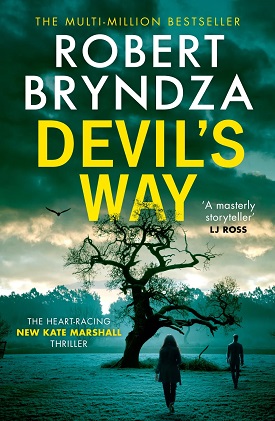 Synopsis:
Synopsis:
The truth hides in the dark . . .
Private Investigator Kate Marshall is rushed to the hospital after being pulled into a riptide in the sea during her morning swim. The near-death experience leaves her understandably shaken.
As she recovers, she befriends Jean, an older patient in the same ward, who relates how her three-year-old grandson, Charlie, vanished without a trace eleven years ago during a family camping trip on Dartmoor. Jean enlists Kate to find out what happened to Charlie.
After she is released from the hospital, Kate and her partner, Tristan, begin investigating that fateful night and discover that Jean’s dark past may have put Charlie in jeopardy.
Was Charlie abducted? Or did he fall into Devil’s Way, a rushing river that vanishes into a gorge close to their campsite?
When Kate and Tristan discover that a social worker who raised concerns about Jean and her daughter, Charlie’s mother, was found brutally murdered shortly after Charlie disappeared, they begin to question everything they thought they knew about Charlie’s family.
Review:

Kate Marshall’s life changed following the sudden death of her dear friend and Alcoholics Anonymous sponsor, Myra. Kate was surprised to learn that Myra bequeathed her business and home to Kate, conditioned on Kate launching her own detective agency. Tristan, her former research assistant at Ashdean University, where Kate was a lecturer in criminology, became her partner. It is now 2018, and together they are running both the agency and the caravan site Kate inherited from Myra which provides an income stream between cases.
Kate has maintained both her sobriety and relationship with her beloved son, Jake, who is now a junior at a California university and opts to remain in Los Angeles for the summer to complete an internship at a prestigious film company. Kate starts every morning, rain or shine, with a swim in the ocean. But on a lovely June day, she immediately notices that something is wrong. She comes up for air and feels a violent current tugging at her waist and legs. As she is dragged back under the water, she realizes that she has been caught in a riptide and is powerless to escape. Meanwhile, while she is fighting for her life, Tristan is staking out a house across town, watching to see if the husband of their client will emerge with another woman.
Twenty-four hours later, Kate awakens in the intensive care unit and learns that she was rescued by a couple of her guests at the caravan site who observed her struggle in the water. As Kate begins recovering, she gets acquainted with another patient, Jean, whose bed is only obscured from Kate’s view by a curtain. Jean overheard the physician mention that Kate is a private detective and begins questioning her about the type of cases she has handled. Specifically, cases of missing persons. Jean is a mere fifty-five years old, but looks nearly two decades older than Kate, who is forty-seven. She reveals that her grandson, Charlie, vanished eleven years earlier and was never found. With his fate undetermined, Jean’s daughter, Becky, could not cope with the loss of her son and took her own life seven years later. Becky blamed Jean for Charlie’s disappearance because Jean and Charlie had gone camping with Becky and Charlie’s father, Joel. Charlie was sleeping in Jean’s tent, and Jean stepped outside intending to remain close by while she smoked a cigarette. But her on-again, off-again boyfriend of many years, Declan Connoly, showed up and Jean ventured further from the tent than originally planned in order to confront and deal with him. By the time she returned, Charlie was nowhere to be found. Along with Becky and Joel, Jean searched for Charlie for several hours before they reported his disappearance to the police and search parties were assembled.
The group was camping at fictional Devil’s Way in the eastern portion of Dartmoor National Park. Author Robert Bryndza fashioned it after Dartmoor and Exeter where he spent summer holidays as a child. His detailed descriptions of the Devil’s Way Tor (an imposing stack of rocks atop a grassy hillside), river, gorge, and a massive sink hole into which authorities suspected Charlie fell, whisk readers away to a beautiful, but mysterious and eerie setting. The area is isolated, and permeated with a sense of brooding and foreboding. There is even an imposing Pixie Tree to which fabric ribbons are affixed as offerings in hopes that wishes will be granted. It is easy to imagine a little boy waking up alone in a tent, frightened, and going looking for his grandmother but losing his way in the dark. Search dogs traced Charlie’s scent to the edge of the river but found no other clues to Charlie’s whereabouts. Eventually, authorities stopped looking for Charlie.
Jean and Tristan agree to take the case with the knowledge that the chances of finding Charlie alive are virtually nonexistent. However, Kate is anxious to provide Jean the closure and peace she is seeking. Kate is moved by Jean’s plight — she has lost both her only child and only grandchild.
Bryndza details Kate and Tristan’s investigative steps, which include reviewing news articles about the case and the evidence amassed by authorities, as well as meetings with police personnel who were assigned to the case and other witnesses. They learn that Joel has moved on with his life — he has remarried, has two young daughters, and operates a pub. Declan Connoly served time in prison and Charlie’s blood was found in his car, but police were satisfied that Charlie cut his hand during an outing with Declan and Jean a few weeks prior to his disappearance. Oof course, they venture to Devil’s Way to inspect the area where Charlie was last seen alive. They also visit the adjacent Danvers Farm and have a run-in with one of its residents. They learn that the prior tenants abruptly departed not long after Charlie went missing. They also discover that Jean was at odds with a social worker who was brutally murdered at around the same time. Could her blood-spattered notebook hold clues to Charlie’s fate?
Once again, Bryndza has crafted a richly atmospheric, cleverly plotted story. He again demonstrates he is equally adept at the construction of complex and suspenseful mysteries, and character development. Kate is changed by her brush with death. She is mortified by her own vulnerability, embarrassed that she had to be rescued and owes her life to the surfers who pulled her from the water. She is also resolved not to let the experience change her lifestyle. Her relationship with Tristan is tested in new ways — they have their first real disagreement — as they work closely together, and Tristan expands his investigative skills with Kate’s mentoring.
They are surrounded by an eccentric and compelling cast of supporting characters, including Jean, the old-before-her-time grandmother who struggled with addiction, as well as a toxic romance from which she was unable to extract herself for far too long and her fractured relationship with her daughter. She is riddled with guilt about Charlie’s disappearance and Becky’s death and traumatized by both events. But her devotion to Charlie and grief over his loss seems genuine, so her failure to be forthright in her dealings with Jean and Tristan is puzzling. Tristan’s old friend Ade makes an appearance, and his sister, Sarah, now a mother, continues to insert herself and her opinions into Tristan’s personal life and professional relationship with Kate. But Tristan is maturing, growing more self-assured and assertive. In addition to Declan and Joel, readers get to know the reclusive Anna through characters with whom she interacted, including the officious and self-aggrandizing Maureen Cook, who ran the Cranborough Writers group of which Anna was a member. Maureen is a “large lady in her late fifties who seemed to have overdone it with the fake tan,” sports blue eye shadow, and loves cruises. She is hilariously proud of her “photostat copier” and dismayed at having been the target of a coup within the writing group.
As Kate and Tristan search for answers, Bryndza injects surprising revelations, red herrings, and shocking details about his characters’ lives and behavior into an evenly paced and emotionally evocative narrative. Only well into the story will readers find themselves guessing, perhaps correctly, about Charlie’s fate. Figuring out the mystery does not diminish the satisfaction of being privy to the various characters’ reactions when the truth is unveiled, especially those who loved little Charlie Julings. Bryndza competently tackles difficult topics, including the devastation of sudden loss, the ongoing effects of grief and guilt, and mental illness in an absorbing, entertaining, and surprisingly moving tale in which he illustrates that sometimes the truth does indeed hide in the dark.
Also by Robert Bryndza:
Kate Marshall Crime Thriller Series
Erika Foster Crime Thriller Series
















Comments are closed.